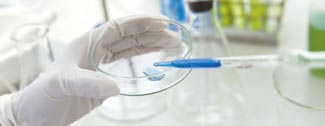
The R&D department cooperates with Research Institutions, Universities and also with Companies in the framework of research programs self financed or co financed by HUMOFERT SA, the Greek State, the European Union and other international organizations.
Even though the main principle for us is "RESEARCH is not limited", the thematic areas of research that interest HUMOFERT SA are summarized below. Naturally the R&D department is always willing to permeate in other scientific fields as long as these are combined with the object, goal and interests of the company.

The achievement of the basic and constant goal of the company which is DEVELOPMENT passes largely through the creation of new innovative products which can offer a competitive advantage in HUMOFERT SA increasing its market share and therefore improving its financial results. In order to achieve its objective HUMOFERT SA systematically invests in RESEARCH, the results of which pave the road leading potentially to INNOVATION.
The R&D department of the company is responsible for the development of new products and technologies which occur after systematic research (industrial research and experimental development) in certain fields of interest for the company. Furthermore, in cooperation with research institutions and universities both in Greece and abroad, the R&D department of HUMOFERT SA conducts basic research designed to generate new knowledge on scientific and technological areas of interest to the company today or in the future.
The funding of the research programs carried out by HUMOFERT SA is based primarily on equity derived from its annual budget. An additional source of funding for research projects of the company is also the subsidies received by the Greek State and the European Union in the framework of the participation of HUMOFERT SA in research projects conducted in partnership with Research organizations, Universities and other companies with a common vision and orientation.